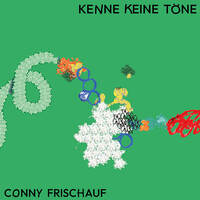CONNY FRISCHAUF
_Anna_Weisser_300.jpg)
After "Die Drift", "Kenne Keine Töne" is the second studio album by the Vienna-based artist Conny Frischauf. Moving between pop and experiment, she embarks on a search for the momentary, the transitions and sonorous threshold spaces, creating a fascinating sound laboratory with "Kenne Keine Töne" that invites us to readjust our listening habits.
"Wo ziehen die Wolken hin?" ("Where are the clouds off to?")*, Conny Frischauf muses in the opening track of her third Album "Kenne Keine Töne". "Habens eilig oder was / Fliegen hurtig nach drüben / Kann ich hier auch nicht verübeln / Also schau ich ihnen zu / Und setze mich gleich drauf / Und merke erst am Boden / Ist doch kein Wattebausch" ("Must be in a rush, flying over there in a hurry / Can't blame them either / So I watch / And sit on them straight away / Only to realise, back on the ground, / that they're not actually cotton balls").
Things around us are not what they seem to be. It is in this spirit that the artist guides us into her synaesthetic sound laboratory in which she acousmatically examines worldly phenomena as sonic events and combines them with delicate pop references. Stones, wind, water and other phenomena thus turn into audible miracles.
In the sixteen tracks of her latest album, Frischauf is playing with our senses. Field recordings, carefully microphoned percussion instruments, aerophones, clapping hands and cosy synth sounds become finely balanced antagonists on this album, digging deep into our auditory canals. From inside the inner ear, this music tingles and nudges us, brushes against us from the inside, making us want to touch our ears, hold them tight for orientation, and ask ourselves: Is it possible to be on both sides of the auditory funnel at the same time?
Frischauf's music is more than audible: it becomes haptic via our sense of hearing – and, on the track "Düfte" ("Fragrances"), even olfactory. There's also a sense in which Frischauf's lyrics and music seem to prioritise space over time. The album is less about clear linear temporal sequences than about the spatial assembly of various possible meanings. Frischauf consciously awards this kind of independence to the sounds and ideas on the album.
Such intention becomes audible on the delicately dubby track "Schall und Schwer", which draws us into a melancholy vortex. Frischauf's vocals sweep over the syncopated bass line, lyrically exploring the relationship between strength and vulnerability. "Schleift sich ein / Dunkt sich rein / Kommt zu mir / Will zu dir" ("Grinding / Submerging / Coming to me / Longing towards you"). The track wanders along these vocals before it finally fades with synthesised snare drums circling around like seagulls.
"Bisschen Träumen" opens with a monotonous beep, perhaps the busy signal of a telephone, which multiplies and finally unfolds into concertante hold music – a hyperreal muzakalic echo chamber filled with longing, dreams and laconicism.
On "Kreise", "Test" and "Nordwestwind", Frischauf directs her contemplative gaze outwards: "Nordwestwind schlägt die Ohren steif / Wir verbrennen in der Mitte / Fallen in die Donau rein / Sie ist warm wie eine Suppe / Sitzen wieder am Kanal / Werden wieder zwangsbeschallt / Sagen nichts und meinen viel / Fliegen hoch im Karussell" ("North-west-wind's beating our ears stiff / In the centre we're burning / We fall into the Danube / Warm as soup / Sitting by the canal again / Sounds booming at us again / We're saying nothing and meaning a lot / Flying high on the merry-go-round"), Frischauf narrates, intertwined with hypnotic ambient noise, onomatopoeic vocals and pulsating beats.
On "Röte", we encounter a polyphonic ensemble of flutes reminiscent of seashell horns. On "M", Frischauf dadaistically defies compulsory duties – the one-letter track title refers to the first letter of the German verb "müssen", i.e. "must"; "Zwei Minuten" is a flirt with established experimental silent composition. As though in a trance, she traces the melodic qualities of percussion instruments ("Interlude") and offers her raw voice on the piece "Nichts" ("Nothing"), which – accompanied by bare background noise – escapes the terror of an everyday flooded by stimuli.
It is the reduction that makes a certain understatement reverberate on "Kenne Keine Töne", and yet this restraint merely conceals Frischauf's passion for sound. Facing such a multitude of ideas, it's striking that the album remains as personal, casual and melodic as it does. A distinct groove emerges and occasionally invites listeners to dance. Conny Frischauf's music drills deeply into the solidified walls of our listening habits.
*all lyrics originally in German
Chrizzi Heinen
Read the info sheet (PDF) in German
Download the info sheet (PDF): English
Download press kit here

_Anna_Weisser_200.jpg)
_Anna_Weisser_Quadrat_200.jpg)